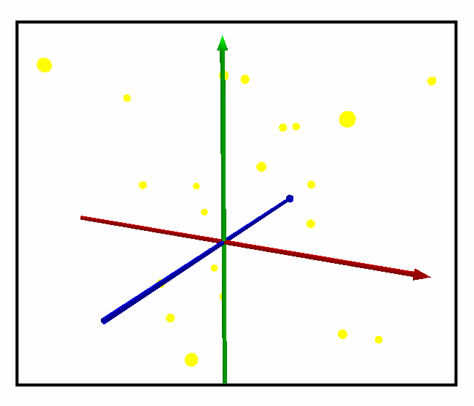 |
This document is archived and information here might be outdated. Recommended version. |
 |
This document is archived and information here might be outdated. Recommended version. |
An ordered collection of points; optionally has measure, height and ID attributes.
Use the ISupportErrorInfo method InterfaceSupportsErrorInfo to determine if the object supports extended error information. If the object supports extended error info, VC++ developers should use the OLE/COM IErrorInfo interface to access the ErrorInfo object. Visual Basic developers should use the global error object Err to retrieve this extended error information.
| Interfaces | Description |
|---|---|
| IClone (esriSystem) | Provides access to members that control cloning of objects. |
| IConstructMultipoint | Provides access to members that construct multiple points using other geometries and values. |
| IGeometry | Provides access to members that describe properties and behavior of all geometric objects. |
| IGeometry2 | Provides access to members that extend the IGeometry interface with a more sophisticated projection method. |
| IGeometry3 | Provides rapid access to a geometry's extent in the x-y plane. |
| IGeometry4 | Provides access to methods that indicate if a geometry has been changed (edited, projected, etc). |
| IGeometry5 | Provides access to members that extend the IGeometry interface with a more sophisticated projection method. |
| IGeometryCollection | Provides access to members that can be used for accessing, adding and removing individual geometries of a multi-part geometry (Multipoint, Polyline, Polygon, MultiPatch, and GeometryBag). |
| IHitTest | Provides access to members that locate a part of a geometry closest to a point. |
| IHitTest3D | Provides access to members that locate a part of a geometry closest to a point. |
| IMAware | Indicator interface that identifies geometric objects that can have persistent M values attached to their vertices. |
| IMCollection | Provides access to members that control operations on M-aware multipoints, polylines, polygons and multipatches. |
| IMSnap | Provides access to a method that snaps ms of the geometry to the precision of the spatial reference associated with the geometry. |
| IMultipoint | Indicator interface that identifies a multipoint object. |
| IPersist (esriSystem) | |
| IPersistStream (esriSystem) | |
| IPointCollection | Provides access to members that manipulate the points of a Multipoint, Path, Ring, Polyline, Polygon, TriangleFan, TriangleStrip, or MultiPatch. |
| IPointCollection2 | Provides access to members that manipulate the points of a Multipoint. |
| IPointCollection3 | Provides access to members that manipulate the points of a Multipoint. |
| IPointCollection4 | Provides access to members that manipulate the points of a Multipoint, Path, Ring, Polyline, Polygon, TriangleFan, TriangleStrip, or MultiPatch. |
| IPointCollection5 | Provides access to members that manipulate the vertices as lightweight point+attribute structures (VA - vertex attribute) |
| IPointIDAware | Indicator interface that identifies geometries that can have persistent point ID values attached to coordinates. |
| IProximityOperator | Provides access to members that find the 2D distance between two geometries. |
| IProximityOperator3D | Provides access to members that find the 3D distance between two geometries with Zs. |
| IRelationalOperator | Provides access to members that determine if a certain spatial relationship exists between two geometries. |
| IRelationalOperator2 | Additional relational functions. |
| IRelationalOperator3D | Provides access to members that determine if a certain spatial relationship exists between two geometries with Zs. |
| IRelationalOperator3D2 | Provides access to members that determine if a certain spatial relationship exists between two geometries with Zs. |
| ISpatialIndex | Provides access to members that create a temporary spatial index for improving performance of "Disjoint" and some other relational operators. |
| ISupportErrorInfo (esriSystem) | |
| ITopologicalOperator | Provides access to members for constructing new geometries based upon topological relationships between existing geometries. |
| ITopologicalOperator2 | Provides access to members that extend the ITopologicalOperator interface. |
| ITopologicalOperator6 | . |
| ITransform2D | Provides access to methods for transforming geometries using either specific parameters or arbitrary transformation objects (affine transformations, geographic transformations, etc.). |
| ITransform3D | Provides access to methods for transforming 3D geometries using either specific parameters or arbitrary transformation objects. |
| IXMLSerialize (esriSystem) | Provides access to members that XML serialize and deserialize an object to/from XML. |
| IZAware | Indicator interface that identifies geometries that can have persistent Z values attached to their vertices. |
| IZCollection | Provides access to operations on Z-aware geometries. |
Note: The order of the points and their number can be modified by ITopologicalOperator::Simplify. Simplify sorts the points by X and Y and removes duplicate.

private static object _missing = Type.Missing;
public static IGeometry GetMultipointGeometry()
{
const double MultipointPointCount = 25;
IPointCollection pointCollection = new MultipointClass();
for (int i = 0; i < MultipointPointCount; i++)
{
pointCollection.AddPoint(GetPoint(), ref _missing, ref _missing);
}
MakeZAware(pointCollection as IGeometry);
return pointCollection as IGeometry;
}
private static IPoint GetPoint()
{
const double Min = -10;
const double Max = 10;
Random random = new Random();
double x = Min + (Max - Min) * random.NextDouble();
double y = Min + (Max - Min) * random.NextDouble();
double z = Min + (Max - Min) * random.NextDouble();
return ConstructPoint3D(x, y, z);
}
private static IPoint ConstructPoint3D(double x, double y, double z)
{
IPoint point = ConstructPoint2D(x, y);
point.Z = z;
return point;
}
private static IPoint ConstructPoint2D(double x, double y)
{
IPoint point = new PointClass();
point.PutCoords(x, y);
return point;
}
private static void MakeZAware(IGeometry geometry)
{
IZAware zAware = geometry as IZAware;
zAware.ZAware = true;
}